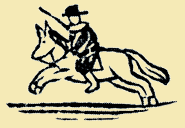Polonius:
“What do you read, my lord?”
Hamlet:
“Words, words, words…”
-- From Hamlet, Act 2, scene 2
At Winedale, our work always begins with the words.
We approach Shakespeare’s words like detectives on the trail of a great mystery. What do these words mean? How do they pull us into a story? To whom is the character speaking them, and why? Is there an attempt to persuade someone of something using these words? What rhythm and texture do the words have? What do they tell us about the unique “voice” or idiom of the character, about his or her inner thoughts and personality? Are there pauses, and if so, where?
Even one line can present an apparently unfathomable mystery, once you begin to dig beneath the surface.
"To be or…
not to be that is
the question"
The words are all we have, essentially, from this man called Shakespeare. He did not leave directions on how to speak them. Everything we need, we must find within the text.
So we speak the words slowly, savor them, sing them loud, whisper them, chant them as a group. As we do this, we “learn our lines” and commit these words to memory – make them ours.
Next we see what happens when one word is given special emphasis, then another, then a sequence of words. We experiment and investigate, keeping an open mind, seeking as many different interpretations as possible. We see how changing one moment, the way we saw one word, can set up a chain reaction of other new moments.
“Go back to the words,” Shakespeare at Winedale founding director James “Doc” Ayres often instructs his students, when they seem to be wandering in the wilderness with their characters.
We listen carefully to one another in a scene, and see how that listening affects the way in which our words emerge in response. In our movements and gestures we attempt to follow Hamlet’s directive to the visiting players:
“Suit the action to the word, the word to the action.”
In essence, as theater director Peter Brook once put it, we are not seeking to “do something” to the words; we are instead seeking to allow the words to do something to us.
Sometimes it feels as if we are knocking on Shakespeare’s door in London, hoping he will answer, desperate to ask him, “What were you thinking when you wrote these words? What is my character really feeling and thinking in this moment?”
But Shakespeare – smiling slightly, enigmatically, in the surviving portraits, like the Mona Lisa – doesn’t answer. We are on our own.
Doc Ayres often shares with his students these lines of T.S. Eliot:
We shall not cease from
exploration
And the end of all
our exploring
Will be
to arrive where we started
And know the place
for the first time
-- From “Little Gidding”
This quest for true “knowing” continues even through the final performance.
Sometimes it is not until then – until a moment of full, concentrated playing before an audience, an experience made possible by a long period of hard work and preparation – that students experience that “click!” and understand the lines of their character in a new way. When that happens, it is a wonderful, revelatory moment for performer and audience alike.
And when such a performance is over, what is the first thing the kids usually say to their teacher?
“I want to do the play again!”


